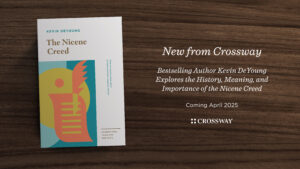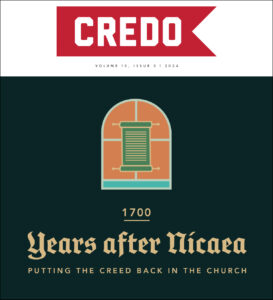As far as the Creed is concerned, I am a Baptist of Baptists.
More specifically, I came to know the great value of the Creed as a Baptist student at Baptist institutions and from Baptist teachers. During my time at three of our seminaries (SBTS, SEBTS, and SWBTS), I was taught to hold high the Creed because of how it faithfully presented Christ according to the Scriptures.
And I saw that reality as an extension of the education I received from my local Baptist church, where as a pre-teen in the bowels of our education wing one of my pastors led a group of students through the articles of the BFM 2000. It was simply assumed by my pastor and by all of us there that our Baptist church (and our convention of churches) was a contemporary, faithful expression and experience of our faith once and for all delivered to the saints.
That’s why I have enjoyed the many conversations leading up to and following from the motion at the Southern Baptist Convention in June 2024 to amend the Baptist Faith and Message by adding Article XIX: The Creed. While there have been many questions, some concerns, and a few objections, they have all been made in good faith and from good Baptists that want the best for the SBC. More than that, they have been conversations among Christians, who at the end of the day want to proclaim to our churches and confess to the dying world that Jesus is Lord!
Because of that, I wanted to address a few common objections to the inclusion of the Creed to the BFM2000:
We have heard that Baptists do not use creeds: That is incorrect historically. The first generation of Baptists included the text of the creeds, especially the Nicene Creed, in their confessions and catechisms. Charles Spurgeon and Adrian Rogers recognized its great value. W. A. Criswell said of the Nicene Creed, “Now isn’t that a magnificent statement to be universally published as the orthodox faith.”
We have heard concern about elevating the Creed to a binding authority for our convention of churches: The role of the BFM in relationship to our churches and its authority therein remains a live (and lively) topic of debate. Its role in relationship to our institutions, however, is more direct. On that front, I would hope that all of our trustees elected, teachers appointed, and missionaries sent would be in full agreement with the Christian faith as articulated for the past 1,700 years of the Christian Church!The first generation of Baptists included the text of the creeds, especially the Nicene Creed, in their confessions and catechisms. Click To Tweet
As it concerns our autonomous churches, inclusion of the Creed into our confessional document would both align with and strengthen the BFM’s stated purpose: to serve as a “guide in interpretation” of the “sole authority of our faith and practice”–the Scriptures. For while Baptist churches may be unique in our emphasis on the authority of the Bible, we need to clarify that we are teaching and preaching Christ according to the Scriptures.
Not only has there been recent theological controversy in our seminaries concerning Christ’s Lordship,[1] there is also a surprising and concerning theological illiteracy in our pews. Lifeway Research’s most recent exhaustive survey, for example, found of American evangelicals who attend church more than once a week, 76% said Jesus is a great being but created by God and 56% say he is not God. And an alarming number of Baptists are leaving our ranks to join Christian cults that reject orthodox Christology.Inclusion of the Creed would further strengthen our guide to interpretation of the Scriptures. Click To Tweet
Inclusion of the Creed would further strengthen our guide to interpretation of the Scriptures, so that both Baptists today and Baptists to come would clearly confess what the Conservative Resurgence protected and what the Christian Church has always proclaimed–that “Old time religion”–that Jesus is Lord!
We have heard that the BFM is sufficient concerning Baptist theology: We also greatly value and appreciate the BFM 2000. Our churches fully ascribe to it, and we require full agreement from our members. It is truly a remarkable confession. However, as both the 1925 and 2000 Committees remind, the BFM is not to be regarded as a “complete statement of our faith.” Specifically, the article on Jesus still remains “most underdeveloped,” according to James Leo Garrett Jr.
Article 2.B is strong in terms of Christ’s incarnation and redemptive mission but could use work on the “book ends.” That is, the article is fuzzy on “the end,” interestingly failing to specify of Jesus Christ, as does the Creed, that “his kingdom shall have no end.” And it is skinny on “the beginning”–especially as it concerns the ontology of the Lord Jesus and his relationship with the Father. Compare on the left the BFM 2000 and on the right the Nicene Creed:
| BFM 2000: 2.B “God the Son” | The Nicene Creed |
| Christ is the eternal Son of God. | We believe in one Lord, Jesus Christ, the only begotten Son of God, begotten of the Father before all ages, God from God, Light from Light, true God from true God, begotten not made, being of one substance with the Father. By him all things were made. |
We have heard that this is not a season for change: While we also would not advocate amending the BFM haphazardly, every generation of Baptists has faced unique and timely challenges. Therefore, it is not coincidental that each generation has sought to make helpful and pertinent amendments to our unifying confession. The Preamble to the BFM2000 explicitly states as much, with the committee acknowledging that they “have been charged to address the ‘certain needs’ of our own generation.”
The Church will ever face both perennial and contemporary heresies. We resonate with the timeliness of the most recent edition of The Southern Seminary Magazine: it is time to “Watch Your Doctrine.” As Dr. Mohler reminds, “At some point, you may be the only one in the room committed to Christ being of the same essence as the Father… At some point, the contrast will be evident. In that moment, be prepared to contend for the faith.” We believe the inclusion of the Creed at this time would directly address the most pressing theological issue of our day: the Lordship of Christ.
Baptists throughout the years have resonated so deeply with the Creed because in it they found a concise guide to Scripture and a clear proclamation of the same Christ they preached from the Scripture. Click To Tweet We have heard that Baptists are settled theologically and we should focus more fully on cultural engagement: We truly have experienced theological resurgence with “The Battle for the Bible.” And we surely are facing great social, cultural, and political challenges. However, we fear that if our convention of churches emphasizes cultural engagement without proper emphasis on christian confession, we may fall prey to what Michael Bird has called “prizing conservatism over orthodoxy.” As B. H. Carroll warned, we fear that if we “shut off the creed, the Christian world will fill up with heresy–unexpected and uncorrected, but nonetheless deadly.”
And the aforementioned controversies and statistics seem to indicate that the primary issue of Christianity, the untrammeled and unqualified Lordship of Christ, remains unsettled both from the pulpit and in the pew.
We joined together to defend the Bible as the inerrant word. We believe it is our opportunity to join with the Christian church throughout the ages in both defending and exalting the incarnate Word. May we clearly stand athwart any danger or threat of diluting our first and fundamental confession as Christians: Jesus is Lord!
With all that being said, let’s not get carried away: Baptists don’t love the Creed. We love Jesus and we love his Bible. It is for those very reasons, however, that Baptists throughout the years have resonated so deeply with the Creed because in it they found a concise guide to Scripture and a clear proclamation of the same Christ they preached from the Scripture.
In this year–the 1,700th anniversary of Nicaea, we look forward to the opportunity to stand with the Christian church throughout the ages and unequivocally confess: “Jesus is Lord!”
Notes:
[1] Cf. the controversy concerning EFS/ERAS that engaged representatives from all of our seminaries on both sides of the debate. Matthew Barrett (MBTS) identifies the position of EFS in this way: “The subjugation of the Son is not just an economic reality, limited to salvation of the incarnation. The subordination of the Son is ingrained in the very DNA of the Trinity apart from creation, within the immanent Trinity itself…There is a split-level hierarchy of authority and subordination inside the Trinity.” Barrett, Simply Trinity, 218. Barrett continues, “In a word, EFS is novel. While EFS claims fidelity to Nicene orthodoxy, it is a clear departure, and one that comes dangerously close to resurrecting heresies the church has long buried” (225). That is, EFS goes against the grain of the Creed, because EFS does not preach the same Christ according to the Scriptures.



